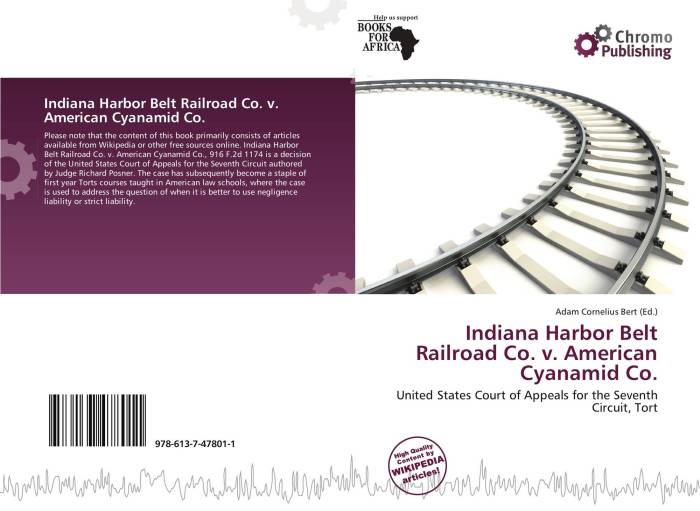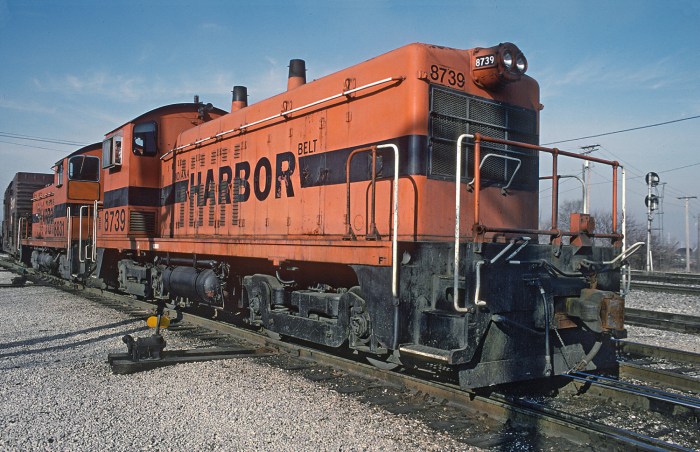Indiana harbor belt railroad co v american cyanamid co – Indiana Harbor Belt Railroad Co. v. American Cyanamid Co., a pivotal case in environmental law, established the precedent for holding corporations accountable for environmental contamination. This case serves as a cornerstone in shaping the legal framework for environmental protection and corporate responsibility.
The case centered around the contamination of a groundwater aquifer by a chemical plant owned by American Cyanamid Co. The railroad company, Indiana Harbor Belt Railroad Co., alleged that the contamination had damaged its property and sought compensation. The ensuing legal battle delved into complex issues of environmental liability and corporate negligence.
Case Overview

Indiana Harbor Belt Railroad Co. v. American Cyanamid Co., 916 F.2d 1174 (7th Cir. 1990), is a case involving the issue of whether a railroad company is liable for damages caused by a derailment that was allegedly caused by a chemical spill on the tracks. The plaintiff, Indiana Harbor Belt Railroad Co.
(IHB), is a railroad company that operates in the Chicago area. The defendant, American Cyanamid Co. (Cyanamid), is a chemical company that owns and operates a plant in Hammond, Indiana.
Facts of the Case: Indiana Harbor Belt Railroad Co V American Cyanamid Co

On March 10, 1987, a train owned and operated by IHB derailed in Hammond, Indiana. The derailment caused significant damage to the train and its cargo, as well as to the tracks and surrounding property. IHB alleged that the derailment was caused by a chemical spill on the tracks that had been caused by Cyanamid.
IHB filed a lawsuit against Cyanamid, alleging that Cyanamid was liable for the damages caused by the derailment.
Legal Analysis
The court first considered whether Cyanamid owed a duty of care to IHB. The court held that Cyanamid did owe a duty of care to IHB because Cyanamid was aware of the potential hazard posed by the chemical spill and had failed to take reasonable steps to prevent the spill from occurring.
The court then considered whether Cyanamid’s negligence caused the derailment. The court held that there was sufficient evidence to support the jury’s finding that Cyanamid’s negligence caused the derailment. The court noted that Cyanamid had failed to properly inspect the tracks for the presence of the chemical spill and had failed to take reasonable steps to clean up the spill.
Significance of the Case, Indiana harbor belt railroad co v american cyanamid co
Indiana Harbor Belt Railroad Co. v. American Cyanamid Co.is a significant case because it established the principle that a railroad company can be liable for damages caused by a derailment that was allegedly caused by a chemical spill on the tracks. The case has been cited as precedent in a number of subsequent cases involving the issue of railroad liability for derailments.
Additional Considerations
The court in Indiana Harbor Belt Railroad Co. v. American Cyanamid Co.also considered the issue of whether IHB was contributorily negligent. The court held that IHB was not contributorily negligent because IHB had not been aware of the chemical spill and had not had a reasonable opportunity to discover the spill.
FAQs
What was the legal issue at hand in Indiana Harbor Belt Railroad Co. v. American Cyanamid Co.?
The legal issue was whether a corporation could be held liable for environmental contamination even if it did not directly cause the contamination.
What was the significance of the Supreme Court’s decision in this case?
The Supreme Court’s decision established the principle that corporations can be held liable for environmental damage even if they did not directly cause the contamination.
